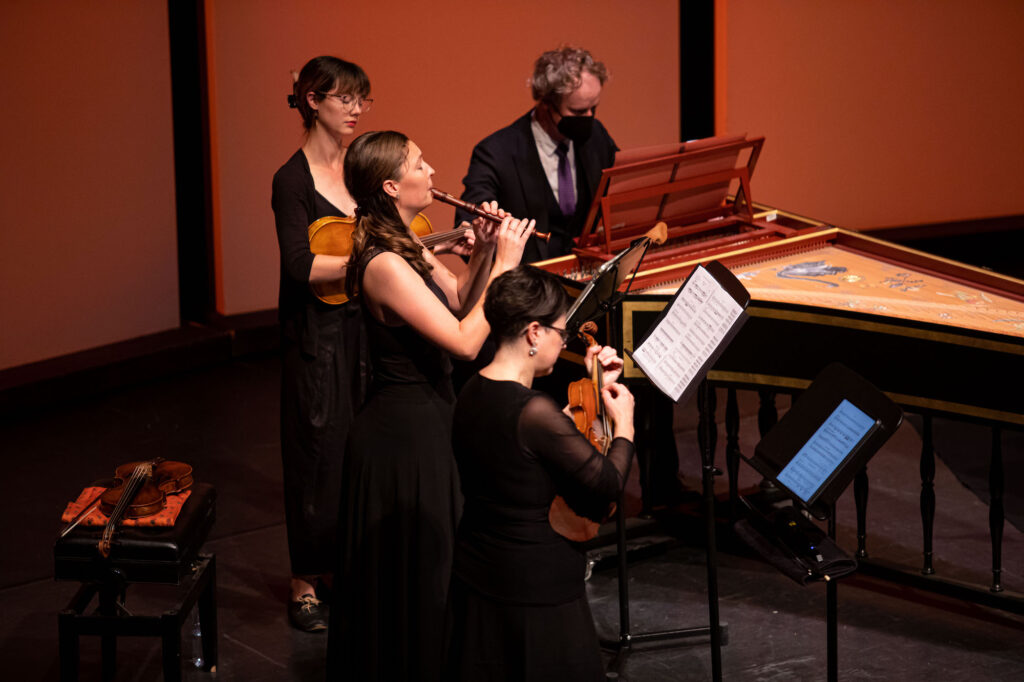Baroque ensemble Van Diemen’s Band offer a timely program that addresses issues around the shifting nature of borders, writes Penny Shaw.
Van Diemen’s Band are bringing down the borders
27 April 2022
- Reading time • 6 minutesMusic
More like this
- Rewriting tradition with skill and charm
- Close encounter stirs the soul
- The great unknown
“Borderlands”, Van Diemen’s Band, presented by Musica Viva ·
Perth Concert Hall, 26 April 2022 ·
A little more than two years ago it was almost unimaginable that Western Australia’s borders would shut and, before they were fully open again, war would start in Europe.
Julia Fredersdorff, artistic director and violinist with baroque specialist ensemble Van Diemen’s Band, began thinking about the concept of borders, of being shut in or kept out, of movements being restricted, and the music that emerges as a result. And so “Borderlands” was born.
It is perhaps appropriate then for Van Diemen’s Band to be the first interstate act that Musica Viva has been able to present in WA since the start of the pandemic.
The Tasmanian-based ensemble did not disappoint. Opening with little-known composer Dietrich Becker, they played with grace and clarity, the music dancing off the page. Communication between the players, particularly violinists Fredersdorff and Simone Slattery and violist Katie Yap, was delightful.
Fredersdorff introduced us to the “Borderlands” suite , described in the program as “works whose combined effect suggests a trajectory of emotions stemming from war and its aftermath”. Although curated before the war in Ukraine, the concept of invasion and the breaching of borders is ever more relevant.
Samuel Scheidt’s Galliard Battaglia was composed in 1621, just three years into the Thirty Years War that ravaged central Europe, but sounded more like a celebration of the “glories” of the battlefield than an emotional response to its horrors. I was expecting tragedy and chaos in the music and it seemed somewhat jarring to instead be confronted with beauty and symmetry. Written before Scheidt’s four children and half the population of his hometown of Halle in Germany were lost to war and plague, it felt unsettling in its positivity. Slattery displayed enviable versatility as she effortlessly moved from violin to recorder, producing a delicate and intricate sound from the much-maligned instrument.

Becker’s Paduan, or funeral music, was also measured and restrained, showcasing the stunning blend of the instruments. For me the highlight of the suite was Les Pleurs, French pathos pouring from the two viola da gamba expertly played by Laura Vaughan and Anton Baba. The dissonant simplicity was extremely moving, making me feel that Jean de Sainte-Colombe had experienced genuine grief. It finished with two dances, Courant by Scheidt, a dance of resentment and Philipp Heinrich Erlebach’s Chaconne, the dance of healing giving Donald Nicolson a chance to shine on the harpsichord and deliver the promised baroque happy ending.
The first half of the program closed with Venetian composer Tomaso Albinoni’s Sonata II in C Major. Written in 1700, this is a delightful piece of music, with the charm and grace of Pachelbel’s Canon. The pianissimo repeated section was exquisite, bringing out the unique tone of the baroque instruments.
If the first half felt a little safe in its choices with no obvious showstoppers or explosions of virtuosity, the second half embraced more diversity. Opening with Georg Muffat, chosen for his border defying roots, and swiftly moving on to contemporary Icelandic composer María Huld Markan Sigfúsdóttir, selected for her genre defying composition Clockworking, which mixed a pre-recorded musical track with the baroque string trio to great effect.
The biggest surprise of the night was Sonata Jucunda, anonymous and unpublished, but attributed to Heinrich Ignaz Franz von Biber who must have been something of a maverick. The professed Ottoman and Hungarian influences produced music that would not sound out of place in Game of Thrones and, alongside some virtuoso playing from Fredersdorff, it was a triumph.
The finale was the world premiere of Nicolson’s Spirals, commissioned by Van Diemen’s Band for this tour. It was charmingly introduced by Fredersdorff, who added so much when she spoke that I wished she could have introduced more of the repertoire. The composition was started before the war in Ukraine and Spirals was then modified to include a melody of a Slavonic Orthodox lament, exquisitely rendered on the recorder and accompanied by gentle strumming on the strings. It was not a “big finish” to bring the audience to their feet but the applause was warm, enthusiastic and prolonged, with many curtain calls and an encore.
Van Diemen’s Band delivered a thought-provoking evening of music with exceptional artistry. It will undoubtedly grow and evolve as it traverses the country over the next few weeks, bringing light to borderlands everywhere.
Pictured top: Van Diemen’s Band delivered a thought-provoking program. Photo by David Cox
Like what you're reading? Support Seesaw.






